

Classic Theories by Kids Development (UK) What Influences Child Development? Where a child lives is an important factor in his development.
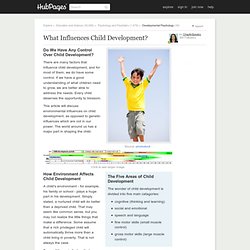
How are the schools? What types of services and opportunities are there in the community? Is there access to good health care? Children often spend a large part of the day in school, and can gain much or not, depending on the quality of the school. If there is a choice for schools, parents should do as much research as possible to find which will serve the child best. Does the community have a library, parks, and community centers for sports and other activities? Does your community have good health care? Check your local library, newspaper, and hospital for child development or enrichment classes.
Cog & lan. Environmental Influences on Human Growth & Development. Nature vs. nurture: does biology or environment influence development? - Mental Health - body, brain, children, disorder, high, meaning, disease, human, people. The nature vs. nurture debate revolves around the following question: what factors contribute to the mental development of an individual: nature (that is, the biological or genetic makeup of a person) or nurture (that is, how a person is raised, by whom, and in what environment)?
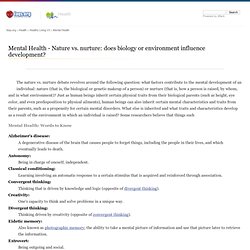
Just as human beings inherit certain physical traits from their biological parents (such as height, eye color, and even predisposition to physical ailments), human beings can also inherit certain mental characteristics and traits from their parents, such as a propensity for certain mental disorders. What else is inherited and what traits and characteristics develop as a result of the environment in which an individual is raised? Some researchers believe that things such Mental Health: Words to Know Alzheimer's disease: A degenerative disease of the brain that causes people to forget things, including the people in their lives, and which eventually leads to death.
Autonomy: Being in charge of oneself; independent. . Developmental Assessment of Young Children. A Practical and Theoretical view.
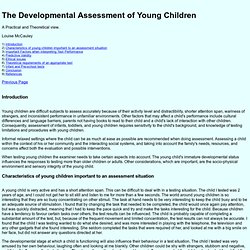
Louise McCauley 1) Introduction 2) Characteristics of young children important to an assessment situation 3) Important Factors when interpreting Test Performance 4) Predictive Validity 5) Ethical issues 6) Theoretical requirements of an appropriate test 7) Infant and Pre-school tests 8) Conclusion 9) References Previous Page Introduction Young children are difficult subjects to assess accurately because of their activity level and distractibility, shorter attention span, wariness of strangers, and inconsistent performance in unfamiliar environments. Informal relaxed settings where the child can be as much at ease as possible are recommended when doing assessment. When testing young children the examiner needs to take certain aspects into account. Assessments under the Children Act - Care and support. If you're the carer of a disabled child, the child may be assessed under the Children Act.

Local authority social services departments have a duty under the Children Act to assess a 'child in need', including children who are disabled. Assessments for children can be done for a variety of reasons. Sometimes they're done because there are concerns about the safety of a child. The assessment process (described below) establishes the needs of a disabled child and which services would best meet those needs. The purpose of the assessment is to draw up a plan of action to address the needs of your child. Assessments under the Children Act - Care and support. Language-biological influences.
Family Factors Affecting Social Development. Author: Elizabeth Grace - Updated: 14 March 2013| Comment Some of us seem to thrive on social interaction while others are most comfortable when operating solo.
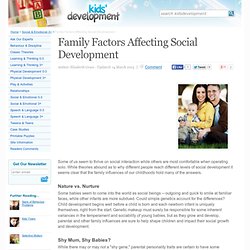
While theories abound as to why different people reach different levels of social development it seems clear that the family influences of our childhoods hold many of the answers. Nature vs. Nurture Some babies seem to come into the world as social beings -- outgoing and quick to smile at familiar faces, while other infants are more subdued. How Genetics Influence Child Development. What determines how a child develops?
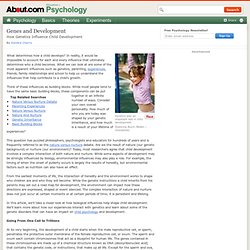
In reality, it would be impossible to account for each and every influence that ultimately determines who a child becomes. What we can look at are some of the most apparent influences such as genetics, parenting, experiences, friends, family relationships and school to help us understand the influences that help contribute to a child's growth. Think of these influences as building blocks. While most people tend to have the same basic building blocks, these components can be put together in an infinite number of ways. Consider your own overall personality. This question has puzzled philosophers, psychologists and educators for hundreds of years and is frequently referred to as the nature versus nurture debate. From the earliest moments of life, the interaction of heredity and the environment works to shape who children are and who they will become. Family Characteristics Have More Influence On Child Development Than Does Experience In Child Care, October 3, 2006 News Release.
Family Characteristics Have More Influence On Child Development Than Does Experience In Child Care A compendium of findings from a study funded by the National Institutes of Health reveals that a child’s family life has more influence on a child’s development through age four and a half than does a child’s experience in child care.
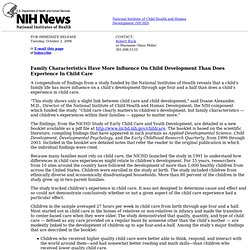
“This study shows only a slight link between child care and child development,” said Duane Alexander, M.D., Director of the National Institute of Child Health and Human Development, the NIH component which funded the study. “Child care clearly matters to children’s development, but family characteristics — and children’s experiences within their families — appear to matter more.” Because many families must rely on child care, the NICHD launched the study in 1991 to understand how differences in child care experiences might relate to children’s development. School effects development. Factors affecting child development. Safeguarding across services.
Safeguarding nspcc. Safeguarding-Children-and-Young-People-Toolkit.